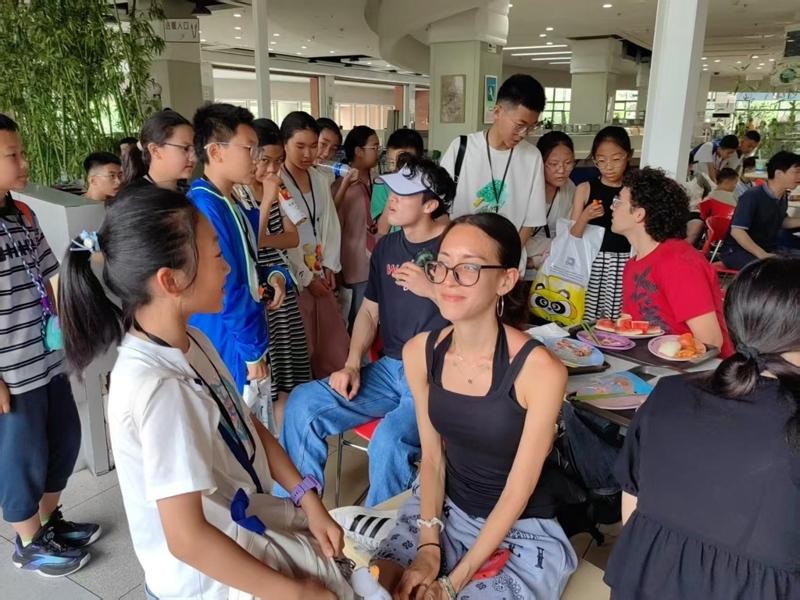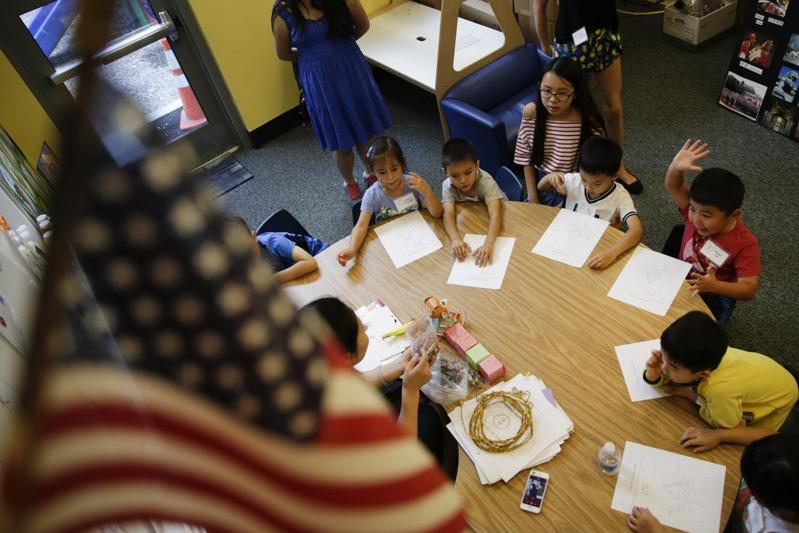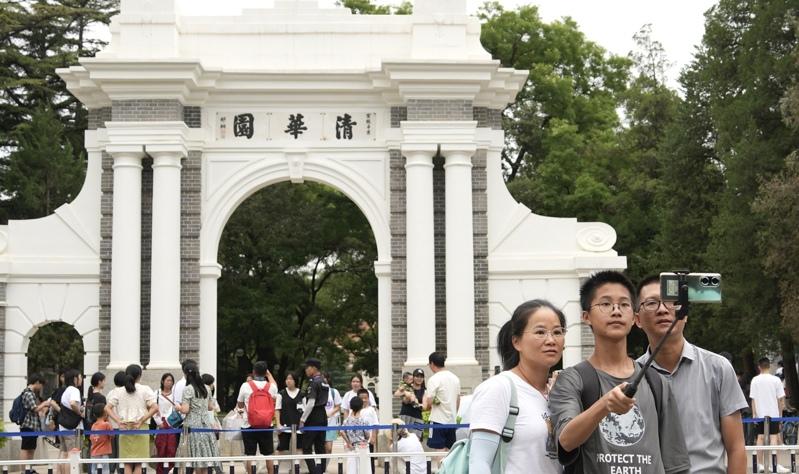
随着我愈来愈深入学习中文,我时常意识到可能在某种程度上我只是在追随潮流,这令我不安。在与好友、同学和陌生人的交谈中——无论是推心置腹还是随意闲聊——我注意到一个反复出现的主题:第二代移民正重新燃起寻求自身文化根源的兴趣。经过多年刻意与自身文化保持距离,比如不愿穿传统服饰、不让同学看见午餐盒、避免在公共场合说母语,如今我们却急切地想找回曾经拒绝的东西。与母国文化创建联系已获得社会广泛认可,甚至成为一种时尚。

对我来说,这种「回归母国」的字面意义,就是回到「母亲的祖国」。我的母亲是中国人,父亲是美国人,这样的组合让我在北京期间常被问到。当人们问我何时开始学习中文及学中文的原因时,我通常会给出一个简短而平淡的回答:「小时候会说一点,初中开始正式学习。我母亲是中国人。」这个解释往往就够了,随后话题通常会转向我的混血身分。
但这个回答过于简化,它忽略了我从小一直学习中文所经历的诸多细节:有些因尴尬而被隐藏,有些则被我暗自珍藏。
我幼时的确说中文,至少是幼儿所掌握的语言能力。四岁前,我每个夏天基本上都在中国度过,我也上过双语幼儿园,看动画片则在英语少儿节目「爱探险的朵拉」、「你好,凯兰」和中文节目「喜羊羊」之间转台。那时我的双语能力是环境所致,而非自主选择。但进入全英文教学的幼儿园后,语言环境立刻发生了180度大转弯。因为父亲完全不懂中文,英语也逐渐成为家中的主要语言。随着时间的推移,我愈来愈不愿意说中文,尤其是在母亲或她的朋友面前。部分原因是我比较害羞,部分原因是不情愿,还有一部分是周围似乎也无人重视中文。

不开口 「母语」快速退步
我记得自己小时候沉默地坐在餐桌旁,听着母亲和她的朋友们用快速的中文说笑,我只是礼貌地点头或用英语回应,当有人直接问我问题,我就转向母亲,让她代答。我知道自己的中文正在退步,而越是这样,我就越避免使用它,从而陷入一种恶性循环。
父母对我中文能力的快速丧失感到震惊,于是在三年级时送我上了周末中文学校。和许多被迫参加这类课程的孩子一样,我对实际学习几乎没有兴趣。我不情愿地去上课,并默默地注意到一些非华裔同学的表现超过了我。但这并没有激励我,反而让我退缩,坚持要父母为我换其他课外活动。
上中学后,学校提供正规中文课程,而我的中文只剩下最基本的水平。从七年级到十年级,我选修了中文课,认真学习,考试能取得高分,水准逐渐提高。但我仍然避免在现实生活中使用中文,即使词汇和文法有了长足进步,我仍羞于与母亲或亲戚练习说中文。
然而大约在这段时间,我对语言学和语言哲学产生了浓厚兴趣。语言塑造我们的思维方式,进而影响我们看待世界的方式,这观点令我着迷。我阅读了许多会多种语言的作家的回忆录,他们描述每种新语言如何重塑他们对自身及周围环境的理解。他们的经历让我钦佩,并深深地打动了我。
同时,美国的文化形态也在改变。身为华人,或拥有任何文化背景的移民,即使不被颂扬,至少在主流社会中获得更多认可。突然间,唐人街成了时髦的午餐地点,旗袍被视为时尚,而会说中文则被视为一项有价值的技能,一种潜在的专业优势。

文化翻转 中文产生价值
在这样的背景下,我加大了对中文学习的投入。十一年级时我选修了中文大学先修课,十二年级参加了大学程度的中文网课程,后来也担任了九年级中文课的助教。
但我中文获得突飞猛进是进入大学之后。身为乔治城大学外交学院的学生,我需要熟练一门外语。我的中文课程从中级汉语开始,到大二时已可以选修商务中文。按照大学的标准,我达到了「熟练」的中文程度。
然而,我并不觉得自己熟练了中文。
我的中文课的同学大多是研究生或华裔第二代。我在课程中表现良好,论文和考试都取得高分,但当被要求说中文时我还是犹豫不决。我严重依赖谷歌翻译、ChatGPT和强大的记忆力,掌握中文词汇和文法。我能写出结构良好的文章,但感觉文化知识浅薄且容易遗忘生字。当有人用中文对我说话时,我还是会愣住。即使经过近十年的正规教育,我仍无法自信地用母亲的母语与她交谈。
我想要的不仅是技术上的熟练——我想要流利、自如和自信地使用中文。我希望能在履历上列出会中文,并确信自己能在专业或私人场合进行有意义的对话。这种渴望促使我申请了中国的暑期留学计划。
在商务中文教授的支持下,我参加了北京清华大学的高级汉语计划。又一次,我发现自己与中文为母语的同学或博士生同处一室。课程形式紧张:没有教科书、电脑或笔记,只有数小时的对话。这种教学方式起初令人畏惧,但最终对我的中文学习起到了有效地促进作用。
这种沉浸式环境迫使我调动所有学过的中文,甚至是深埋记忆中的碎片。我第一次能够自在地与陌生人交谈。我开始用中文思考,而不是用英文思考后再进行中文翻译。我用中文解释中文新词汇,而不是依赖英文的对应词。我终于理解那些会多种语言的学者在回忆录中描述的感受——学习用另一种语言思考能够从根本上改变你的世界观。

成语共鸣 探索情感表达
中文的词汇和成语——尤其是四字成语——能够表达英语往往难以传达的思想和情感。身为一个天生习惯用隐喻思考的人,这种沟通方式深深引起我的共鸣。它让我意识到,我的某些世界观早已在很久以前就被这门语言塑造,只是我未曾清醒地体认到。如今,随着中文能力的提升,我能够探索新的视角──不仅是关于语言,还有哲学、宗教、政治,以及最重要的,关于我自己。
这段漫长而不完美的旅程教会我最重要的一课,是谦逊的必要性。如果我能早点放下骄傲——无论是五岁时不愿开口,还是青少年时期因犯错而感到尴尬——或许我就不会失去这门语言。如果我能提早接受不适感,如今的口语能力或许就能与读写程度相符。语言学习需要正视自己的脆弱,它要求我们在追求语言上的清晰和文化上的链接的过程中,愿意跌跌撞撞,磕磕绊绊。而现在,我第一次觉得自己准备好了。
(崔罕娜是乔治城大学的三年级学生,将于秋季在伦敦政治经济学院进行为期一年的交换)

Reflections on Learning Chinese
As I progress in my study of Chinese, I often find myself quietly unsettled by the realization that I may be, in part, a follower of trends. In conversations—ranging from thoughtful to fleeting—with close friends, classmates, and strangers, I’ve noticed a recurring theme: the resurgence of interest among second-generation immigrants in reconnecting with their heritage. After years of distancing ourselves from our cultures—hesitating to wear traditional clothing, hiding home-cooked meals, avoiding speaking our native language in public—we now seem eager to reclaim what we once rejected, perhaps because it has become socially acceptable, even fashionable, to do so.
For me, this return to the “motherland” is, quite literally, a return to my mother’s land. My mother is Chinese, my father American—a combination that has prompted its fair share of questions throughout my time in Beijing. When people ask when I began learning Chinese and why, I usually offer a quick, unremarkable response: I spoke a bit as a child and began formal instruction in middle school. My mother is Chinese. That explanation tends to suffice, and the conversation often shifts toward my mixed ethnicity.
But that answer is an oversimplification. It omits the nuances of my experience—some I’ve hidden out of embarrassment, others I’ve quietly held with pride.
I did speak Chinese as a toddler—as much as a toddler can speak. I spent summers in China until the age of four, attended a bilingual daycare, and split my screen time between Dora, Ni Hao, Kai-Lan, and 喜洋洋. I was bilingual by circumstance, not by deliberate choice. But when I entered kindergarten and began attending an English-only school, the shift was immediate. At home, English became the default language as well, since my father doesn’t speak or understand Chinese. Over time, I grew more reluctant to speak Chinese, particularly around my mother or her friends. Part of it was shyness, part of it was apathy, and part of it was a quiet resistance to engaging with something that no one else around me seemed to value.
I remember sitting silently at dinner tables as rapid-fire Chinese filled the room, nodding politely or responding in English, letting my mother speak on my behalf when someone addressed me directly. I knew that my Chinese was slipping, and the worse it got, the more I avoided using it—entering a self-perpetuating cycle of disengagement and embarrassment.

Alarmed by how quickly I was losing the language, my parents enrolled me in weekend Chinese school in third grade. Like many children forced into such programs, I had little interest in actually learning. I showed up begrudgingly, relied on shortcuts, and quietly observed that some of my non-Chinese peers were outperforming me. Rather than let that motivate me, I withdrew, insisting I pursue another extracurricular instead.
By middle school, when Chinese was offered as a formal language class, I had only the most rudimentary skills. I took Chinese from seventh through tenth grade, earning high marks and making slow but steady progress. Yet I continued to avoid speaking it in real-life contexts, still feeling too embarrassed to practice with my mother or relatives, even as my vocabulary and grammar improved.
Around this time, however, I became deeply interested in linguistics and the philosophy of language. The idea that language shapes how we form thoughts—and therefore how we see the world—fascinated me. I read memoirs by polyglots who described how each new language reshaped their understanding of themselves and their surroundings. Their experiences struck me as both admirable and deeply moving.
Meanwhile, cultural dynamics in the U.S. were also shifting. Being Chinese—or having any kind of cultural background—was becoming, if not celebrated, at least more accepted in mainstream spaces. Suddenly, Chinatown was a trendy lunch destination. Qipaos were considered stylish. And speaking Chinese was seen as a marketable skill, a potential professional advantage.
Within this context, my commitment to studying Chinese deepened. I took AP Chinese in my junior year, enrolled in a college-level course as a high school senior, and later served as a teaching assistant for a ninth-grade class.
But the most meaningful progress came in college. As a student at Georgetown’s School of Foreign Service, I was required to demonstrate proficiency in a foreign language—an expectation most students meet and then exceed by pursuing a minor in the same language. I began my Chinese coursework at the intermediate level, and by sophomore year I was studying Business Chinese. According to the university’s standards, I achieved “proficiency” in the language.
Still, I didn’t feel proficient.
Most of my classmates were graduate students or heritage speakers. I did well in the course—earning strong grades on essays and exams—but I hesitated when asked to speak. I relied heavily on Google Translate, ChatGPT, and a strong memory. I could produce well-structured writing, but the knowledge felt shallow and easily lost. I still froze when someone spoke to me in Chinese. Even after nearly a decade of formal education, I was unable to confidently converse with my mother in her native tongue.
What I wanted was not just technical proficiency—I wanted fluency, ease, and confidence. I wanted to be able to list Mandarin on a résumé and know that I could hold a meaningful conversation in a professional or personal setting. That desire led me to apply to summer study abroad programs in China.

With the support of my Business Chinese professor, I enrolled in a program at Tsinghua University in Beijing. Once again, I found myself in a classroom with native speakers and PhD students. The course format was intense: no textbooks, no computers, no notes—just hours of conversation. It was intimidating at first, but ultimately transformative.
That immersive environment forced me to draw on all the Chinese I had ever learned, even the pieces buried in the recesses of my mind. For the first time, I felt comfortable speaking with strangers. I began thinking in Chinese rather than translating from English. I defined new vocabulary with other Chinese words, rather than relying on English equivalents. I finally understood what the polyglots in those memoirs had described—that learning to think in another language can fundamentally shift your worldview.
Chinese has vocabulary and idioms—particularly the 成语—that express ideas and emotions with a richness English often lacks. As someone who naturally thinks in metaphors, this way of communicating resonated deeply. It made me realize that some of my worldview had already been shaped by this language long ago, in ways I hadn’t consciously acknowledged. Now, with a stronger grasp of Chinese, I could explore new perspectives—not just on language, but on philosophy, religion, politics, and most importantly, myself.
One of the most important lessons I’ve learned through this long and imperfect journey is the necessity of humility. If I had set aside my pride earlier—as a five-year-old unwilling to speak, or a teenager embarrassed by mistakes—I might never have lost the language. If I had embraced discomfort earlier, my speaking skills might now match my reading and writing abilities. Language learning requires vulnerability. It requires a willingness to stumble in pursuit of clarity and connection.
And now, for the first time, I feel ready to do just that.
(Hannah Block is a junior at Georgetown University)







